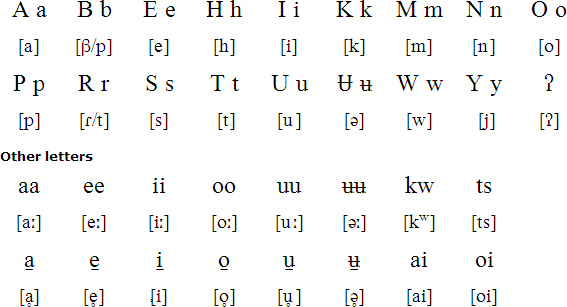Comanche is an Uto-Aztecan language spoken in south west Oklahoma in the USA. In 2013 there were 30 native speakers of Comanche, out of a total Comanche population of about 15,100. The language was formerly spoken in Texas, New Mexico, Kansas, Colorado and Oklahoma.
In the early years of the 19th century many Comanche children were taken from their homes and educated in boarding schools where the language of instruction was English. They were punished for speaking Comanche and as a result, soon spoke only English. By the middle of the century only the elders could still speak the language.
In 1989 the Comanche Tribe began a project to preserve the language and the history of their ancestors. The end result was 15 two-hour tapes featuring 40 tribal elders telling stories and family history in their native tongue. During the following two years a number of language classes were organized by individual tribal members, all working independently.
In 1993 the Comanche Language and Cultural Preservation Committee was formed with the vision of reviving Comanche as a living language. The Committee wants to provide the opportunity for Comanche people of all ages to be able to speak, write and understand their language in order that it and their culture might live on.
In 1994 the Comanche Tribe adopted a Comanche alphabet and spelling system developed by Dr. Alice Anderton, a linguistic anthropologist at the University of Oklahoma, Norman. Since then a number of Comanche books, dictionaries, and other materials have been published.

Stress normally falls on the first syllable of a word. If it falls elsewhere, an acute accent is used to indicate this.
Download an alphabet chart for Comanche (Excel)
Comanche language = nʉmʉ tekwapʉ̱
English Language = taibo tekwapʉ̱
Do you speak Comanche? = ʉnha nʉmʉ tekwaʔeyu?
Hello! = marʉ́awe (to 1 person),
marʉ́awebu̱kwu̱ (to 2 people),
marʉ́aweeka/marʉ́aweka (to a group),
haa marʉ́awe (hi), marʉ́awekwai (tell me all about it)
How are you? = ʉnha hakai nuusuka?
Fine, and you? = tsaatʉ̱, ʉntse?
I'll see you tomorrow! = noo nʉ pʉetsʉ̱ku ʉ punine!
My name is .... = nʉ nahnia tsa ....
What's your name? = ʉnha hakai nahniaka?
What's the Comanche word for ...? = hakai ... nʉmʉ nahniaka̱?
Do you understand me? = ʉnha nʉ naki̱supanaʔinʉ̱?
I understand you = ʉ naki̱supanaʔitʉ nʉ
I don't understand you = ke nʉ ʉ naki̱supanaʔitʉ
Kiowa Tribe = kaiwa
Please = haamee
Thank you = ʉra
How old are you? = ʉnha hʉʉ tomopʉ̱?
Yes = haa
No = kee
Spanish Language = yuhu taibo tekwapʉ̱
Fry bread = yuhu nookopʉ̱
1 = sʉmʉ
2 = wahaatʉ̱
3 = pahiitʉ̱
4 = hayarokweetʉ
5 = moʔobetʉ̱
6 = naabaitʉ̱
7 = taatsʉkwi̱tʉ̱
8 = namewatsʉkwi̱tʉ̱
9 = wʉmhinatʉ̱
10 = sʉʉmarʉ
Comanche pronunciation and useful words supplied by Benjamin Bruce
Information about Comanche | Phrases | Numbers
Information about the Comanche language
http://en.wikipedia.org/wiki/Comanche_language
Information about the Comanche people, their history and culture
http://kathleen_burnett.homestead.com/Comanche.html
The Comanche Language and Cultural Preservation Committee
http://www.comanchelanguage.org/
Hello Oklahoma - Benjamin Bruce's site about the native languages of Oklahoma
http://www.hello-oklahoma.com
Comanche phrases
http://www.angelfire.com/creep2/fracod/comanche.html
Comanche, Cora, Hopi, Huarijio, Huichol, Ivilyuat / Cahuilla, Kawaiisu, Luiseño, Mayo, Mono, O'odham, Nahuatl, Nawat (Pipil), Northern Paiute, Serrano, Shoshone, Southern Paiute, Tarahumara, Tepehuán (Northern), Tepehuán (Southeastern), Tepehuán (Southwestern), Timbisha, Tongva, Yaqui
Languages written with the Latin alphabet
Page last modified: 12.09.23
[top]
You can support this site by Buying Me A Coffee, and if you like what you see on this page, you can use the buttons below to share it with people you know.

If you like this site and find it useful, you can support it by making a donation via PayPal or Patreon, or by contributing in other ways. Omniglot is how I make my living.
Note: all links on this site to Amazon.com, Amazon.co.uk
and Amazon.fr
are affiliate links. This means I earn a commission if you click on any of them and buy something. So by clicking on these links you can help to support this site.
[top]